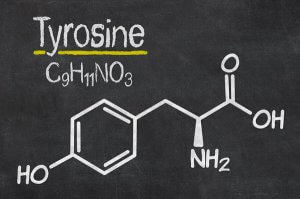Table of Contents
Key Takeaways
- Tyrosine boosts working memory, executive function, and creativity.
- It aids in stress reduction, mood improvement, and anxiety alleviation.
- Tyrosine lessens symptoms of ADHD.
- L-Tyrosine is a crucial precursor for catecholamine neurotransmitters.
- In a hurry – click here to learn more about getting an effective dose of L-Tyrosine in: Mind Lab Pro®
L-Tyrosine is the master precursor required to form all catecholamine neurotransmitters.
Your brain uses the enzyme tyrosine hydroxylase to convert L-Tyrosine into L-DOPA. Decarboxylation of L-DOPA results in synthesis of the neurotransmitter dopamine.[i]
Once converted into dopamine, the enzyme dopamine-beta-hydroxylase converts L-DOPA into norepinephrine (noradrenaline).
And Phenylethanolamine n-methyltransferase converts norepinephrine into epinephrine (adrenaline).
This triad of neurotransmitters are collectively known as “catecholamines”.
Tyrosine can be a highly effective nootropic for boosting cognitive function. And is particularly helpful in maintaining cognitive performance when you’re under practically any kind of stress. Including music played above 90 dB’s.
L-Tyrosine works in synergy with stimulants like methylphenidate (i.e. Ritalin).[ii] Drugs like Ritalin work by blocking the reuptake of the neurotransmitters dopamine, and norepinephrine. And if there’s not enough dopamine available to do the job, Ritalin doesn’t work very well. L-Tyrosine potentiates increases in extracellular dopamine.
L-Tyrosine also stimulates the production of thyroid hormones T3 (triiodothyronine) and T4 (thyroxine) which are crucial in maintaining both overall physical and cognitive health.
L-Tyrosine can boost libido, memory, focus, concentration, mood, offers anti-depressant effects, and improves executive function in those with ADHD.
Tyrosine helps:
- Cognitive Stress. L-Tyrosine produces the catecholamine-triad of neurotransmitters dopamine, norepinephrine, and epinephrine. Sleep deprivation and extreme stressors like heat and cold can deplete catecholamine levels. L-Tyrosine restores them to preserve optimal cognition.[iii]
- Neurotransmitters. L-Tyrosine is a required precursor for dopamine, norepinephrine, and epinephrine. As your dopamine levels increase, you’re better able to concentrate, organize your thoughts, and stay productive.
- Attention Deficit Disorder (ADHD). L-Tyrosine can be an effective treatment for ADHD symptoms. It works in synergy with pharmaceutical drugs like Ritalin and Adderall by boosting extracellular levels of dopamine. Helping these drugs be more effective. And mitigating side effects like crashes when the drug wears off.
Overview
Your brain converts L-Tyrosine to L-DOPA which then produces the neurotransmitter dopamine. The unused dopamine is then further converted into the neurotransmitters norepinephrine (noradrenaline) and epinephrine (adrenaline). This triad of neurotransmitters are collectively referred to as “catecholamines”.
 “Tyrosine” is derived from the Greek word tyros, meaning cheese. It was first discovered by German chemist Justus von Liebig in 1846 in the protein casein from cheese.
“Tyrosine” is derived from the Greek word tyros, meaning cheese. It was first discovered by German chemist Justus von Liebig in 1846 in the protein casein from cheese.
Tyrosine is considered a non-essential amino acid because it can be synthesized in your body from phenylalanine. Which is found in many high-protein foods such as poultry, fish, dairy, nuts, soy products, lima beans, avocados and bananas.
L-Tyrosine amino acid supplementation enhances working memory and executive function in the prefrontal cortex. It helps with creative flow states, is fuel for inspiration, cognitive flexibility, and the kind of “convergent thinking” you do in multiple choice exams.
L-Tyrosine assists in the production of thyroid hormones T3 (triiodothyronine) and T4 (thyroxine) which are crucial in maintaining both overall physical and cognitive health.
L-Tyrosine vs N-Acetyl L-Tyrosine (NALT): What’s the Difference?
N-Acetyl L-Tyrosine (NALT) is the amino acid L-Tyrosine with an acetyl group added. When you take NALT as a supplement, it breaks down in your kidneys back into L-Tyrosine. So in theory, the two supplements offer the same benefits.
There is some debate in the nootropics community on which is more effective. NALT or plain L-Tyrosine. NALT is a more soluble form of L-Tyrosine so it should be more bioavailable to your body.
However, some studies report that in some cases, a sizeable percentage of supplemental NALT is excreted in urine before it’s converted into L-Tyrosine.[iv]
On a personal note, I haven’t had any issues using NALT as a source of L-Tyrosine. It gives me a dopamine and adrenal boost you’d expect from supplementing with a dopamine precursor.
But when I haven’t any NALT around I successfully switch to L-Tyrosine although at a slightly higher dose.
When dealing with ADHD/ADD, L-Tyrosine is particularly effective when stacked with ALCAR (Acetyl-L-Carnitine). ALCAR easily crosses the blood-brain barrier for boosting acetylcholine levels. And seems to positively influence serotonin levels. And Tyrosine provides my brain with the dopamine it needs to mitigate symptoms of ADHD/ADD.
I find that L-Tyrosine stacked with 20 mg of Ritalin twice a day works particularly well. Clearly, this brain doesn’t have the capacity to produce enough dopamine on its own. And needs the boost that comes from supplementing with Tyrosine.
So like all nootropics, YMMV. Always take into account how each nootropic works synergistically with others in your stack. And how they work with any meds you need to take.
This is as much art as it is science. And experimentation is key for optimal cognition.
How does L-Tyrosine work in the Brain?
L-Tyrosine boosts brain health and function in several ways. But two in particular stand out.
- L-Tyrosine improves memory and cognition under acute stress. Acute stress is defined as short-term stressors that can affect cognition. Examples are extreme heat or cold. Things like cold showers, extreme sports, car accidents, relationship problems, intense movies, business deals gone awry, exams and war zones.
In one study done at the University of Bedfordshire in the UK, the effect of L-Tyrosine on cognitive performance was measured before an exercise task.
Researchers recruited 8 soccer players. And had them complete a 90-minute soccer simulation performance test in an environmental chamber set at 77 degrees Fahrenheit.
The soccer players were given either L-Tyrosine before exercise or a placebo. Cognitive performance was measured before the exercise task. Then again at “half-time”, following half time, and following the entire simulation.
The cognitive performance task assessed dual-task and vigilance. The outcome revealed that cognitive vigilance and reaction time among soccer players significantly improved following administration of L-Tyrosine.
Results showed that in warm-weather conditions, L-Tyrosine could enhance cognitive function and prevent cognitive impairment during exposure to exercise-heat stress.[v]
- L-Tyrosine boosts neurotransmitters. L-Tyrosine taken as a supplement converts into the neurotransmitter dopamine. Dopamine helps control movement in your body, is fundamental to memory, attention and problem solving.
The unused dopamine can then convert into the neurotransmitters norepinephrine (noradrenaline) and epinephrine (adrenaline).
Norepinephrine is important for attentiveness, emotions, sleeping, dreaming and learning.
Epinephrine drives your ‘flight-or-flight’ response. It’s what prompts your reaction to dangerous circumstances, emergency situations, or in stressful situations or environments.
In one study done in the Netherlands, researchers determined if L-Tyrosine would boost cognitive resources associated with cognitive control. They performed tests designed to measure “working memory” using the N-Back Test.
Study participants were assigned to engage in a “1-back” condition of easy difficulty and then a 2-back condition of tougher difficulty. Those that used L-Tyrosine demonstrated superior performance in the 2-back test, but not the 1-back test.
The study authors suggested that L-Tyrosine provides greater cognitive enhancement when cognitive demand increases. The bottom-line; supplementation of L-Tyrosine may help you increase your IQ score due to maximizing catecholamine reserves.[vi]
How things go bad
As we get older, our brain and body chemistry and energy metabolism changes.
 ↓ Dopaminergic neurons are damaged or die
↓ Dopaminergic neurons are damaged or die
↓ Neurotransmitter levels decline
↓ Thyroid hormones decline
↑ Stress levels increase
↓ Working memory and mood decline
All of these changes are often attributed to aging. But could be a result of dietary and lifestyle choices.
Unchecked, they could lead to neurodegenerative diseases like Parkinson’s, a drop-in quality of life and depression.
L-Tyrosine benefits
L-Tyrosine can boost levels of the neurotransmitters dopamine, norepinephrine, and epinephrine. And contributes to the production of thyroid hormones T4 and T3.
Tyrosine can help boost cognition especially in stressful situations. It helps improve decision making, ‘flow state’ and creativity, cognitive flexibility, and working memory.
L-Tyrosine converts into L-DOPA to produce dopamine. L-DOPA is also used to make melanin in your body. This conversion process helps in the removal of neurotoxic quinones. And chelates heavy metals like mercury and lead which can accumulate in and damage neurons.
The dopamine that is not used by your brain is available to produce norepinephrine (noradrenaline) which is important for attentiveness, emotions, sleeping, dreaming, and learning.
L-Tyrosine can be an effective nootropic when stacked with ADHD/ADD meds like Ritalin or Adderall. It helps supply extracellular dopamine needed to improve the effectiveness of stimulants used to boost the uptake of dopamine in your brain.
How does L-Tyrosine as a nootropic feel?
Keep in mind that L-Tyrosine is a precursor to catecholamines. So if you’re not ‘low’ on dopamine, norepinephrine or epinephrine – you may not ‘feel’ anything.
 Many neurohackers report a lift in mood, better focus, concentration, increased energy, and an overall sense of well-being. L-Tyrosine can help readjust your motivation levels. It can help lower anxiety levels, especially social anxiety.
Many neurohackers report a lift in mood, better focus, concentration, increased energy, and an overall sense of well-being. L-Tyrosine can help readjust your motivation levels. It can help lower anxiety levels, especially social anxiety.
Supplementing with L-Tyrosine can help bring your blood pressure down if its elevated from a stressful situation or environment. Take it before the stressful event if you can.
L-Tyrosine helps buffer the effects of stimulants like caffeine or amphetamines. It helps potentiate and prolong the effects of Ritalin or Adderall, and reduces the crash.
If you’re into athletics or do manual work, you’ll find that supplementing with L-Tyrosine before a workout or construction job will leave you feeling great afterwards. It helps mitigate many of the effects of acute stress caused by short-term stressors.
And L-Tyrosine helps your body to produce melanin, so you may find it easier to get a tan while at the beach.
L-Tyrosine Research
L-Tyrosine to treat ADHD
Several studies have investigated using L-Tyrosine for the treatment of attention deficit hyperactivity disorder (ADHD). One informal study published in the 1980’s determined that L-Tyrosine resulted in short-term relief from ADHD symptoms. But subjects eventually reached tolerance and a diminished effect.
This is important for neurohackers to keep in mind. It seems that L-Tyrosine on its own can benefit some more than others. Regardless if you’re treating ADHD, or are perfectly cognitively healthy.
I’ve seen more than one report of nootropic users experiencing tolerance after just a week of supplementing with L-Tyrosine. But most peer-reviewed, published studies show positive results.
One study published in Neuropsychiatric Disease and Treatment in 2011 looked at using amino acid precursors for the treatment of deficit hyperactivity disorder (ADHD). Including L-Tyrosine for dopamine, and 5-HTP for serotonin.
The study used 85 young people aged 4 – 18 years old, all with a clinical diagnosis of ADHD. They were treated for an initial period of 8 – 10 weeks.
Urinary samples to determine serotonin and dopamine levels were collected within the first 4 weeks. If they didn’t reach adequate levels, subjects were moved to higher dosing levels 2 and then 3 until they got relief from symptoms.
Researchers found that the dopamine and serotonin precursors yielded similar results to Strattera and Ritalin. And “the amino acid protocol may be equal in efficacy to potent, pharmaceutical ADHD medications”.[vii]
L-Tyrosine reduces blood pressure under stress
This study is particularly interesting for its nootropic application. It’s commonly understood that blood pressure rises when we’re under stress. The source of stress doesn’t really matter. Stress up = blood pressure up.
A study in Amsterdam showed that L-Tyrosine administration decreased blood pressure about 15 minutes after ingestion. This study involved assessing task performance following acute stress.
Acute stress is usually short-term and can be caused by driving, fighting, athletics, martial arts training, war, combat training, CrossFit, cold showers, loud music, intense movies, loud noises, business deals, relationships, school, exams and more.
The point is, this study is applicable to every one of us. The study found that L-Tyrosine reduced diastolic blood pressure within 15 minutes of taking the supplement. And blood pressure normalized within 1 hour.
This study tells us that L-Tyrosine may promote a decrease in blood pressure caused by stress. And could be used to mitigate the effects of stressful situations if taken prior to the stressful event.[viii]
L-Tyrosine promotes cognitive flexibility
Cognitive flexibility applies to those who can adjust their thinking quickly to adapt to novel situations and stimuli. A high degree of cognitive flexibility is associated with increased fluid intelligence, superior reading and comprehension, and a healthier brain.
Recent research (2015) supports the idea that L-Tyrosine promotes cognitive flexibility. In this trial, researchers recruited 22 adults. And setup a double-blind, placebo-controlled study.
All subjects were assigned a task switching procedure to measure their flexibility. The results showed that receiving L-Tyrosine supplementation increased cognitive flexibility compared to the placebo group.
The researchers determined that “L-Tyrosine can facilitate cognitive flexibility by repleting cognitive resources”.[ix]
The team observed that increased cognitive flexibility was likely due to a boost in dopamine concentrations. They noted that L-Tyrosine enhanced usage of various cognitive resources. And one way to increase your cognitive flexibility would be to start supplementing with L-Tyrosine.
It stands to reason that people who are close-minded, set it their ways, are resistant to change and can’t cope with unexpected stimuli or situations have “cognitive rigidity”. And it’s likely due to suboptimal dopamine levels.
L-Tyrosine Dosage
L-Tyrosine suggested dosage for cognitive benefit is 500 mg – 2 grams per day.
You may find your body responds to smaller doses. Or even more if you’re stacking it with stimulants like ADHD meds. Listen to your body and see how you react.
If you find you do not experience the full benefit from L-Tyrosine, then try using it an hour before or two hours after a meal. Because L-Tyrosine taken as a supplement may compete with other amino acids in food for transport into your system.
I personally stack L-Tyrosine with my Ritalin dose twice per day. And a final dose of L-Tyrosine late afternoon to prevent a stimulant crash.
NOTE: long-term use of L-Tyrosine can suppress serotonin. Symptoms include depression, fatigue or severe anxiety feeling much like a panic attack. You can easily counter this by supporting serotonin with a 250 – 500 mg L-Tryptophan about 60 mins. before bed.
L-Tyrosine Side Effects
L-Tyrosine is considered non-toxic and very safe. Most neurohackers and healthy human adults don’t have any negative side effects from using amino acid tyrosine as a nootropic supplement.
At higher doses there are reports of stomach issues and migraines. Migraine problems usually happen to those who already suffer from migraines. This may be an indication that your neurotransmitter levels are already optimal, and you don’t need to supplement with L-Tyrosine.
L-Tyrosine can increase your thyroid hormones. So if you’re hyperthyroid you should use caution when supplementing with L-Tyrosine because it may change the way your thyroid meds work.
And if you’re taking MAO inhibitors (MAOI’s) like selegiline, Azilect, Marplan or Nardil you should not use L-Tyrosine.
Monoamine oxidase inhibitors (MAOIs) work in your brain by blocking the enzyme monoamine oxidase. This enzyme normally blocks excess dopamine. But when you block the enzyme, more dopamine is released.
So using L-Tyrosine in combination with MAOI’s could raise dopamine levels too high. Resulting in a rapid rise in blood pressure (hypertensive crisis). Causing severe headache, nausea and sweating, severe anxiety, rapid heartbeat, chest pain, vision changes, shortness of breath and confusion.
A severe increase in blood pressure from this combo can lead to hemorrhagic stroke or a heart attack.
Where to buy L-Tyrosine
L-Tyrosine is available to buy in powder, capsule and tablet form. Capsules and tablets are usually 300 – 500 mg.
Some pre-made nootropic stacks and workout stacks also include L-Tyrosine as part of their formula.
N-Acetyl L-Tyrosine (NALT) is an alternative to plain L-Tyrosine. NALT has an acetyl group added to L-Tyrosine in an attempt to make it more bioavailable.
For example, Mind Lab Pro® contains 11 brain enhancing nootropic compounds including N-Acetyl L-Tyrosine.
I recommend Mind Lab Pro because it addresses all aspects of anxiety resistance, memory and cognitive enhancement, stabilizes mood, brain repair, and maintenance.
This premium nootropic stack is designed to affect neurotransmitters, cognitive energy, brain waves, neuroprotection, and regeneration. See my Mind Lab Pro review for a detailed report.
Ensure you read labels carefully and stick with manufacturers who follow Good Manufacturing Practices (GMP). And are GMP-Certified. And do your best to avoid toxic “other ingredients” which are usually listed at the bottom of “Supplement Facts” labels.
Nootropics Expert Recommendation
 L-Tyrosine 500 mg – 2 grams per day
L-Tyrosine 500 mg – 2 grams per day
I recommend using L-Tyrosine as a nootropic supplement.
Your body does synthesize some L-Tyrosine from phenylalanine which comes from high-protein foods like chicken, fish, almonds, avocados and bananas.
But most of us don’t get enough L-Tyrosine from our diet. So supplementation will help.
L-Tyrosine is helpful for most neurohackers to combat stress and sleep deprivation. It’ll boost dopamine, norepinephrine and epinephrine levels.
It’s particularly helpful if you take L-Tyrosine prior to a stressful situation, workout or physically demanding job.
L-Tyrosine is especially helpful to those dealing with ADHD/ADD. It’s a great compliment to stack with stimulant meds like Ritalin or Adderall. L-Tyrosine will provide the dopamine your brain needs. It will help smooth out and prolong the effects of stimulant meds. And help prevent the associated crash when they wear off.
A good stack for ADHD is using your usual med dose with L-Tyrosine 500 mg, Alpha GPC 300 mg, and ALCAR 500 mg. Which is should particularly effective if you are dealing with any phenylalanine abnormalities.
You can buy individual L-Tyrosine supplements. Or you could try my favorite pre-formulated nootropic stack Mind Lab Pro® which includes N-Acetyl L-Tyrosine (NALT).
Mind Lab Pro contains a synergistic blend of 11 brain enhancing nootropics covering all aspects of cognition and brain health. See my full Mind Lab Pro review for more.
You can safely use up to 2,000 mg per day when stacking with ADHD meds. But in smaller divided doses throughout your day.









Join The Discussion - 417 comments
Kimme
May 21, 2020
In your opinion, is NALT better than or equal to Mucuna for treating Parkinsons?
David Tomen
May 22, 2020
Kimme, Mucuna Pruriens extract is better for Parkinson’s because it supplies the natural form of L-DOPA that is sometimes used in place of synthetic prescription L-DOPA. But note that you need an extract of 90% for a direct comparison. Otherwise with a lower extract like 20 or 30% you’d need to use more for a similar benefit.
Kimme
May 23, 2020
Thanks, David. Do you see any benefit to adding tyrosine to a daily regimen of mucuna?
David Tomen
May 24, 2020
Kimme, it entirely depends on the individual and how much more dopamine they need. I use both because I’m Adult ADD and my brain is starved of dopamine if I don’t use enough L-Tyrosine during the day. And I find that additional Mucuna seems to help.
But you need to be aware of the symptoms of excess dopamine. I know that when I overdo it, I feel jittery and amped up. A feeling I do not like.
Mike
May 11, 2020
Dear David,
What would you suggest to a man wity cyclothymia (gentle form of bipolar)? Most of the time these days I feel mentally exhausted: brain fog, 0 alertness, absentmindedness etc. I tried l-tyrosine for about two weeks and felt nothing from it. I do feel a calming effect of L-Theanine and together with coffe it makes me more “normal”, that is with better cognitive skills. Rhodiola Rosea causes headaches the 2nd day I take it. For keeping up my energy throughout the day I need to take daily 100% of Vitamin B complex. Magnesium helps when I get magnesium-depleted. I do not know the cause for the way I have felt ever since I was like 20 years old. I was on anti-depressants (mostly SSRIs) when things got really bad. I stopped taking anti-depressants a few years ago and developed the cyclothymia. Re-tried SSRI and they didn’t work, they just made me sleep 20 hours a day. Any tips? Was thinking about 5-HTP+L-Tyrosine but again, L-Tyrosine I feel no effect of.
David Tomen
May 11, 2020
Mike, you need to figure out what the cause is of what you’re trying to treat. The only accurate way to do this is go through the precursors one at a time until you feel some benefit. For example, Alpha GPC for acetylcholine, L-Tryptophan for serotonin (stay away from 5-HTP), L-Tyrosine for dopamine, GABA for GABA, L-Glutamine for glutamate, etc.
You try each for a day or two and see what happens. If there’s no benefit then you try the next.
Your body and brain absolutely requires a high quality B-Complex and magnesium every single day. NOT when you ‘think’ you’re deficient. Because you are. Most of us are unless we’re using supplements.
When you start with things like L-Theanine, Rhodiola and others you must learn exactly how each works in your brain. L-Theanine for example boosts the neurotransmitters serotonin, dopamine and GABA. In other words when using something like L-Theanine, if you feel some benefit you don’t really know why. Rhodiola Rosea acts like an MAOI. Which means it boosts dopamine and norepinephrine.
But if you do find that you need to boost serotonin by using L-Tryptophan, know that dopamine and serotonin must stay in balance. Boost serotonin too much and you depress dopamine. That’s when you need L-Tyrosine. Not so you ‘feel’ anything. But so you don’t screw things up.
If this is overwhelming or doesn’t make sense consider booking a consultation with me. Probably save you a lot of time and headaches too. 🙂
Mike
May 12, 2020
I think I’ll start with L-Tryptophan in order to boost serotonin. You mention here on the website that it’s way safer than 5-HTP and that it can be used for months if I recall correctly. Should I still use it together with L-Tyrosine or can take only L-Tryptophan for a few weeks and see if it works. If it does, only then take L-Tyrosine in order to avoid depletion of other neurotransmitters?
David Tomen
May 13, 2020
Mike, you can try L-Tryptophan for a few days and see if it works. You should get results quickly because this is a direct precursor to the synthesis of serotonin.
But depending on your dose you should likely use L-Tyrosine morning and noon for dopamine. For two reasons; 1. to keep serotonin and dopamine in balance. 2. depending on your age you likely need more dopamine anyway.
If neither helps, let me know and we’ll try another strategy depending on what you’re trying to achieve.
Michael
May 24, 2020
Dear David,
I’ve been taking l-tryptophan for approx. a week now. Once I started taking it, I also quit coffee cold turkey. So as the week went by I fought with more brain fog than I usual but didn’t feel as sleepy at 1:00 p.m. as usual. Energy curve was more balanced but that’s surely the caffeine I quit. Can’t say l-tryptophan helped though or at least I don’t feel a difference in my well being as was described here nor did I feel that calming effect l-tryptophan is supposed to give you. What I did feel was pushing myself to do more and more which shows I’m on my high again – at the very top of it to be more precise. So I generally am mood-cycling no less than usual. I did not take any l-tyrosine throughout the week either though. Any tips?
David Tomen
May 26, 2020
Michael, I’m sure you’re aware of the importance of keeping dopamine and serotonin in balance. What you may not be aware of is the caffeine in coffee was boosting your catecholamines. Dopamine in particular. Quitting it “cold turkey” likely threw your balance off kilter.
Because boosting serotonin with L-Tryptophan while losing the extra source of dopamine you had with coffee upsets what your brain was accustomed to. If you stay off coffee, I suggest trying L-Tyrosine during the day (morning & noon) and L-Tryptophan before bed. It’ll take some trial and error to get dosages right. And there’s no guarantee it’ll work. But it’s worth a try …
Mike
May 31, 2020
Dear David,
I tried l-tryptophan + l-tyrosine for a few days. Taking only L-tryptophan gave no effects whatsoever. Including l-tyrosine twice a day (500mg each time) heavily increased my anxiety to the extent of experiencing very shallow breathing, increased heart rate, stress and a general urge to do more, more and more in a shorter period of time (which is exactly what triggers my anxiety in the first place and generates that unnecessary speed in my life which I do not want and need at all). I need something which will create exactly the opposite effect – something which will slow me down (in a positive way; not make me sluggish, delayed), calm me down, help to keep the stress level in check, not feed my anxiety in any way. Based on the above, would you be able to suggest something different?
David Tomen
June 1, 2020
Mike, you could try L-Theanine (https://nootropicsexpert.com/l-theanine/) which helps balance things out including brain waves that promote an alert relaxation and boost in creativity.
There are several adaptogens that may help as well. It’s just finding the right one or two for you. Check out this post and see if anything here resonates: https://nootropicsexpert.com/top-7-nootropic-adaptogens-to-conquer-anxiety-and-stress/
Or a balanced nootropic stack like Mind Lab Pro: https://nootropicsexpert.com/mind-lab-pro-review/
Mike
June 2, 2020
Dear David,
I tried L-Theanine a while ago. There’s no question about it that this nootropic works but its power is not enough for me. I need something stronger for diminishing mood cycling symptoms on both the highs (mania) and lows (depression). My worst nightmare in my everyday functioning are poor memory, poor recall and connection of facts and brain fog. What would you say to N-Acetyl L-Cysteine (NAC)? Or maybe something else?
Thank you for your support!
David Tomen
June 2, 2020
Mike, your comment about brain fog may be the best route for you to take. See my post on it here: https://nootropicsexpert.com/best-supplements-for-brain-fog/.
You may need to go through the process described in that post to figure out what the cause is of your symptoms. For example, it could be oxidative stress and/or inflammation, a hormone problem or nutrient deficiency. Please read through that post and see if anything resonates with you.
And BTW, NAC comes under the inflammation category because it’s a precursor to glutathione which is one of your main antioxidants.
David
March 28, 2020
Hello David and readers,
Background: I have inattentive-type ADHD and work in a high-stress professional field. I have had greater difficulty handling long-term stressors as of late and reviewed an IEP from childhood that stated I displayed features of Conduct Disorder and, while not stated explicitly, I am aware of Antisocial Personality Disorder association, some features of which are present. I had been feeling generally a bit “off,” so, having a biochem background, followed the medical literature on serotonin/monoamine deficits associated with ADHD and depression (of which I do not have a personal history, but a first-degree relative). I take Vyvanse 50mg daily.
Question:
– Between tyrosine/acetyl-tyrosine/L-dopa for addressing dopamine levels and tryptophan/5-HTP for addressing serotonin levels, which (or which combination/relative ratio) is most efficacious?
– Is there an ideal ratio (or ballpark) on serotonin precursors: dopamine precursors?
Thanks
David Tomen
March 29, 2020
David, there is no “ideal ratio” because even though others are clinically ADD or ADHD, each of us is “wired” different. And neurotransmitter levels, gene expression, vitamin and other cofactor levels, oxidative stress, free radicals and other inflammatory factors are going to influence what your brain needs. So trial and error is key.
I’m Adult ADD and use prescription stimulants too. Based on my experience and that of thousands of others in our community, I respectfully suggest your approach is too simplistic.
Please see my post on dealing with ADHD with nootropics here to better understand what I mean and other nootropics you should consider for best results: https://nootropicsexpert.com/best-nootropics-for-adhd-add/
Carola
March 27, 2020
Helo David, thanks so much for all the information. I have read a lot! I was diagnosed with adult adhd and started with stimulant medication but it gave me anxiety so i stopped. After that i tried 500 mg of l- tyrosine 1 hour before breakfast together with vit b complex and 200 mg of rhodiola and 3 hours after i take it i start getting short anxiety attacks plus stomach pain. I also take 100 mg of l- tryptophane a couple hours before bed. My question is do you think the anxiety/panic could stop after taking the l-tyrosine in the morning if i take it WITH the l-tryptophane? And also could the stomach pain stop if i take it with or after food intake? I’m running out of ideas for my adhd! Thank you so much.
David Tomen
March 28, 2020
Carola, the problem is likely Rhodiola Rosea because it acts like an MAOI. Which also then boosts dopamine and norepinephrine. That could cause the anxiety attacks.
Please take a look at my ADD/ADHD protocol in the following post for the best nootropic stack I’ve found for ADHD with or without stimulant medication: https://nootropicsexpert.com/best-nootropics-for-adhd-add/
joe
January 21, 2020
Steven. I’m on two anti-depressants so would like advice on nootropics for this? Do you suggest the precursor l-tryptophan for serotonin 5-HPT or is there better than won’t give me serotonin syndrome (excess 5-HPT)? Personally, I’ve been to pharmacy school and I looked at precursors 5 years ago, tried them for 3 days and found no benefit so thought it was a scam. How many days should it take to see me potentiate adderall with l-tyrosine? Also do you know the ratio of caffeine to adderall to potentiate adderall? I found it to be 300 to 1 caffeine to adderall on rats but not sure yet. I’ve tried caffeine and tums with adderall with no benefit but I never “proved” it. Please fill me in. Thanks so much,
Joe
David Tomen
January 21, 2020
Joe, there are some components in caffeine that stimulates the release of dopamine from cells. But that’s assuming there’s enough dopamine present to begin with. And you need all the cofactors and precursor needed at a minimum to encourage dopamine synthesis.
Precursors boost neurotransmitters. But they don’t to them in isolation. The associated cofactors like vitamins and minerals must be present as well. And then your brain requires other factors to encourage the signalling necessary for your to feel it.
You’re not going to potentiate Adderall. You’ll support its use by providing things like L-Tyrosine, ALCAR, Alpha GPC or CDP-Choline, DHA, and a high quality bio-identical multivitamin/mineral supplement.
Harlen
January 10, 2020
Hi David,
I have taken adderall for about 15 years and have constantly battled the dopamine depletion; depressed mood and anxiety. I probably naturally have moderate anxiety and adderall no doubt accentuates it. I am beginning to try a stack of L-Tyrosine with my adderall. My questions is should I take first thing in the morning with my medication an hour before eating? Or is it better to take at night to replenish the dopamine from adderall usage? I have read both ways but cannot decipher if one way is better than the other. I am also reading that it may also be helpful to take 5 HTP to help with serotonin? Any feedback would be appreciated. I have experimented with a litany of supplements (theanine, magnesium, etc) over the years to counteract some of the negative side effects of adderall…
Thanks,
Harlen
David Tomen
January 11, 2020
Harlem, you definitely need L-Tyrosine if you are using Adderall and know you are dopamine deficient. But please do not use it after 4 PM if you want to sleep that night.
All is explained in this post: https://nootropicsexpert.com/best-nootropics-for-adhd-add/.
You are correct that dopamine and serotonin must be in balance for this to work. Because high dopamine will depress serotonin and vice versa. But I do not recommend 5-HTP for raising serotonin.
L-Tryptophan is far safer and easier to dose and will keep on working month after month. 5-HTP on the other hand has been shown to stop working after a few weeks of consistent daily use. And is far too easy to dose incorrectly.
Harlen
January 12, 2020
Should the L-Tryptophan be taken at a certain time?
David Tomen
January 13, 2020
Harlen, most take L-Tryptophan about an hour before bed because it produces serotonin which then goes on to make melatonin. Not something most can use early in the day without getting sleepy.
Atis
December 18, 2019
Hi David,
Thanks for breakdown.
My target is to get more social comfortable and be more efficient in communication, by boosting my mood i seem to get more confident and can easily achieve things mentioned before. As well i want to be more focused and motivated in my daily job.
Right now i am going through trial & error phase stacking together, – L tyrosine +organic matcha green tea, +mild coffee (latte) + oat straw extract (+every second or third day B complex), – this combo is superb for me i light up like a Christmas tree, – confident, mentally sharp, focused and productive and somehow i am more efficient in my communication as well as more confident in social situations. P.S i tried bacopa as well but after few days i got really bad fatigue which took all the effects away from me, so i stopped using it.
Can you please comment if my stack is optimal for my goals and if not is there better alternatives ? Maybe healthier ones ?
Thanks,
Atis
David Tomen
December 18, 2019
Atis, the problem is most think that dopamine is at the heart of motivation and focus. The thing is there is a missing link in the dopamine pathway leading to motivation and focus.
Turns out that activating this pathway starts with stimulation of glutamate AMPA-receptors that connect to dopamine neurons. Which in turn follows the pathway to the nucleus accumbens. The brain structure linked to motivation, pleasure and reward.
Check out the following post on how this all works and what nootropics you need to get to where you want to be: https://nootropicsexpert.com/hacking-motivation-with-nootropics/
Atis
December 19, 2019
Thanks David for bringing clarity to this.
Would you say that Rhodiola could actually help with motivation ? Is L tyrosine + Rhodiola synergetic ?
Thanks,
Atis
David Tomen
December 19, 2019
Atis, they are synergistic and Rhodiola Rosea must have some influence on motivation. Because in Russia it was issued to workers to “make them more productive”.
Jason
November 29, 2019
Hello David,
Could you give me a stacks formula for strong motivation beside L Tyrosine, what else works?
David Tomen
December 1, 2019
Jason, contrary to what most people including scientists think, dopamine alone does not boost motivation. When glutamate AMPA-receptors in the dorsal raphe nucleus area of your brain are stimulated it ends up activating the dopamine reward system. Which is at the heart of boosting motivation.
I explain how this works in “Hacking Motivation with Nootropics” and which nootropics work to boost it: https://nootropicsexpert.com/hacking-motivation-with-nootropics/